Project Description
AnthroTox is an interdisciplinary research group addressing health and environmental challenges. The team, including social anthropologists, historians, STS scholars, environmental toxicologists, and chemists, collaborates to understand the impact of anthropogenic toxicants in societies and ecosystems. Currently, AnthroTox focuses on persistent organic pollutants (POPs) from electronic waste in Tanzania, investigating the global issue of POPs accumulating in the food chain. The research aims to provide empirical data on environmental justice, particularly in East Africa, where there is a significant attraction to hazardous substances.
Goal
AnthroTox aims to establish a sustainable foundation for global toxicant research collaborations. The long-term vision involves broadening the scope to investigate various substances and diverse environments, ensuring a comprehensive understanding of the challenges posed by anthropogenic toxicants.
Objectives
To understand:
- Social processes related to the spread of toxicants, and activities leading to exposure and harmful effects;
- Relationships between ecosystem exposures of anthropogenic toxicants and chemical management strategies (waste handling and regulatory efforts);
- The role of history, postcolonial situation, and global political economy in the production, distribution, effects, and handling of toxicants;
- Local and international risk-containing, regulation, and monitoring efforts, their intended and unintended effects, and their relation to scientific knowledge production.
To contribute to:
- Public debate on political economy, consumption and production, ethics, and policy concerning environmental pollution.
- Local, national and transnational forms of environmental engagement and activism, and their interplay with other social and political processes.
- National and international policy and regulatory processes pertaining to environmental toxicants, and reflection about these.
Ph.D. Projects
E-waste as source of environmental contamination in Tanzania: Accumulation of organochlorines, brominated flame retardants and metals in coastal ecosystems and urban landfills
Ane Haar (funded by UiO Life Science)
In my research project I will investigate whether e-waste is a source of environmental contamination in various coastal ecosystems. Tanzania represent a model of a growing economy with an increasing demand for electronic products along with insufficient recycling regulations and practices. In this region of the world, there is a need for empirical data on how chemicals associated with e-waste may enter the environment and accumulate in food webs. I will study tropical marine food webs, mangrove ecosystems and urban landfills and measure concentrations of contaminants such as flame retardants, plasticizers, PCBs and heavy metals, which are toxic compounds associated with e-waste. I am interested in studying if these chemicals accumulate in various water bodies, marine invertebrates and fish, domestic eggs and vegetables, and if they biomagnify in the food web. I will study how contaminant levels and patterns reflect trophic level, lipid dynamics and possible sources, and whether they represent a threat to humans.
Following the making, implementation and enactment of e-POP regulations in their postcolonial encounters
Franziska Klaas (funded by UiO Life Science)
My research project addresses the politics and practices of transnational efforts to regulate Persistent Organic Pollutants associated with electronic waste (e-POPs). Located at the interface of Social Anthropology and (Postcolonial) STS, my project aims at understanding the many-layered trajectories of e-POP regulations in the making, their implementation within the national frameworks of Tanzania and Norway as well as them shaping electronic waste recycling practices. Designed as a multi-sited ethnographical research, I will follow flows and connection of e-POPs within the ‘Global North’ and the ‘Global South’. Thus, my project depends on collaboration with a variety of actors ranging from scientist, to policy makers and entrepreneurs and includes research in Norway and Tanzania in equal parts. This symmetric approach does not intend to create sameness where there is difference or asymmetry bequeathed by history. Yet, it intends to take up a position that moves beyond narratives of functionality and dysfunctionality. Regulations and emerging or existing practices linked to e-POP regulations provided with history and coincidently put into context.
In order to achieve this my project includes the unfolding of relevant (post-)colonial histories in Norway and Tanzania, figuring out their conjunctions and detachments related to current e-POP regulations.
Practices of repair and repairability, notions of response and responsibility – approaches to consumer electronics and e-waste among repairers in Norway and Tanzania
Christian Medaas (funded by UiO Life Science)
My research focuses on practices of repair related to small consumer electronics (mostly smartphones, tablets, laptops, but also stereos and toaster ovens) in Norway and Tanzania, based on ethnographic fieldwork with small-scale repair technicians, community repair movements, and regimes of material re-use and recycling across locations. Through this, I engage theoretically with repair practices as social, material (and variously but invariably political) responses to issues of waste creation, designed irreparability and planned obsolescence, consumerism, and the accumulating problem of e-waste and its attendant persistent organic pollutants. I ask how repair practices in different forms and contexts can be forms of tinkering with the prescribed material and temporal realities and values of objects. I also interrogate how repair can constitute forms of resistance and care, attending to the practical/material, social, and political/environmental meanings that repair has for its practitioners, thus engaging with the contemporary right to repair discourse, as well as scholarship in sustainability, design, DIY culture, and science and technology studies.
By working collaboratively with repair technicians in both Norway and Tanzania, I engage with practices and practitioners of repair (and reuse/recycling) as they emerge, diverge, and converge across very different contexts. My research explores the ways in which people relate with increasingly ubiquitous but often decreasingly durable/reparable electronic devices and their designers, many of whom have become infamous for their implementation of barriers to repair (manifested in hardware, software, or even legal forms). What can repair practices tell us about design, (hyper)consumerism, global inequality, north/south relations, e-waste, and environmental crises?
Chemical Pollution, Toxic Exposures, and Environmental Health in Tanzania
Signe Mikkelsen (funded by UiO Life Science)
My research explores the landscape of chemical pollution, anthropogenic toxicants, exposure, and environmental health in Tanzania. Based on one-year of ethnographic research in Dar es Salaam, the project investigates how various stakeholders, ranging from public health experts, traditional healers, government officials, NGOs, scientists to everyday citizens, perceive, address and negotiate these issues.
Tracing both past and current configurations, the project also examines what practices, responses, and politics materialise from them, as well as Tanzania as a destination of unequal flows of hazardous substances within a larger global political economy. Moreover, it analyses the uncertain space cancer and other toxin-related health effects inhibit within these larger concerns by assessing the notion of scientific evidence and expertise, thereby opening up for other ways of knowing and lay epidemiology.
Working in the intersections of anthropology, toxicology, and environmental health, this interdisciplinary study seeks to understand how and in what ways scientific evidence and bodily experience translates, or does not translate, into scientific knowledge and reaches levels of public consciousness in the framework of toxic exposures and health.
Furthermore, in attempting to understand the presence, proliferation, and harmful effects of anthropogenic toxicants - and bridging divides between the natural and social sciences - an important part of this project is also a joint-fieldwork component and on-going collaboration with two toxicology Ph.D. students from the University of Oslo, who also form part of the AnthroTox and UiO: Life Science initiative.
Understanding spatial and temporal trends in e-waste related pollutants in a developing country
Maja Nipen (funded by UiO Life Science)
The environmental chemistry part of the AnthroTox project aims at furthering the understanding of spatial and temporal trends in e-waste related pollutants like the persistent organic pollutants (POPs) and heavy metals in a developing country. Tanzania is used as a model to represent a developing country experiencing economic growth and growth in domestic use and import of electronics, and low degree of regulation and control on e-waste.
E-waste can contain some reusable components and some valuable metals, which makes recycling and/or reuse economically beneficial and desirable from a resource perspective. E-waste also contains potentially harmful substances such as mercury, cadmium and lead, as well as compounds that fall in the category of POPs, such as polychlorinated biphenyls (PCBs) and polybrominated diphenyl ethers (PBDEs). POPs are characterized by persistence in the environment, toxicity, potential for bioaccumulation and potential for long range environmental transport (LRT).
The content of harmful substances in e-waste imply that recycling of electronics need to occur under controlled circumstances. With informal recycling techniques, which include burning, shredding and dumping of unusable parts in landfills, the POPs contained in the e-waste can be released into the environment, and thus represent a threat to human health and the environment. Due to the physical/chemical properties of POPs, these processes can be particularly problematic when e-waste is handled in a warm climate.
There is currently little knowledge on the levels and distribution of e-waste related POPs and heavy metals in Tanzania, and other developing countries in a similar situation, which leaves a gap in our understanding of these pollutants that this project aims to help narrow.
Hacking Life: Electronic salvaging in an African digital age
Samwel Moses Ntapanta (funded by UiO Life Science)
My research explores the practices performed on electronic waste (e-waste) that support certain emerging local economies and their connections to global e-waste flows, value creation through salvaging and risks involved during e-waste encounters with humans in Dar es Salaam and Zanzibar cities, Tanzania.
Despite these electronics often being regarded as waste in developed countries, it seems they emerge in global south perhaps not as waste, but as fluid temporal objects converged into new assemblages in which they take on fresh values through salvaging activities. Focusing on these practices, my research seeks to understand and elaborate on the ingenuity practices by local repairers known as fundi that seem to challenge the very concept of waste by creating new or adding value to the defunct electronics.
On top of that, the project will seek to understand urban mining practices of precious metals like gold, copper and the like from e-waste, how business is conducted in local settings and its connections to global markets. These salvaging activities offer the entry point for my study to comprehend the relationships of electronic devices and the people of the global south.
Output
Articles
- Burning matters: life, labor, and e-waste pyropolitics in Ghana by Peter C. Little. Anthropology Southern Africa. 46(2), pp. 04-06. https://doi.org/10.1080/23323256.2023.2221305.
- Geissler, P. W. and R. J. Prince (2020). "British sofas and global toxic flows." Anthropology Today. 36(6): 1-2. https://doi.org/10.1111/1467-8322.12614.
- Geissler, P. W. and R. J. Prince (2020). "‘Toxic worldings’: Introduction to toxic flows." Anthropology Today. 36(6): 3-4. https://doi.org/10.1111/1467-8322.12615.
-
Haarr A., Nipen M., Mwakalapa E.B., Borgen A.R., Mmochi A.J., Borgå K. (2023) "Chlorinated paraffins and dechloranes in free-range chicken eggs and soil around waste disposal sites in Tanzania". Chemosphere. 329: 1-11. https://doi.org/10.1016/j.chemosphere.2023.138646.
-
Haarr A., Mwakalapa E.B., Mmochi A.J., Lyche J.L., Ruus A., Othman H., Larsen M.M., Borgå K. (2021) "Seasonal rainfall affects occurrence of organohalogen contaminants in tropical marine fishes and prawns from Zanzibar, Tanzania." Science of the Total Environment. 774: 1-10. https://doi.org/10.1016/j.scitotenv.2021.145652.
-
Haarr A., Mwakalapa E.B., Lyche J.L., Mmochi A.J., Polder A., Ruus A., Borgå K. (2022) "Spatial variation in contaminant occurrence in marine fishes and prawns from coastal Tanzania". Environmental Toxicology and Chemistry. vol.41(2): 321-333. https://doi.org/10.1002/etc.5254.
-
Klaas, F. and N. Nyabise (2021). "Incinerating hazardous waste for the public good." Anthropology Today. vol.37(4): 15-18. https://doi.org/10.1111/1467-8322.12665.
-
Klaas, F. and S. Bauer (2022). "Endocrine Disrupting Substances. A Partial Inventory Synthetic Becoming." L. Vesela. Berlin, K Verlag: 252-277.
-
Nipen, M., Vogt, R. D., Bohlin-Nizzetto, P., et al. (2022). "Spatial trends of chlorinated paraffins and dechloranes in air and soil in a tropical urban, suburban, and rural environment." Environmental Pollution. vol.292: 1-9. https://doi.org/10.1016/j.envpol.2021.118298.
-
Nipen, M., Vogt, R. D., Bohlin-Nizzetto, P., et al. (2022). "Increasing Trends of Legacy and Emerging Organic Contaminants in a Dated Sediment Core From East-Africa." Frontiers in Environmental Science. vol.9: 1-13 https://doi.org/10.3389/fenvs.2021.805544.
-
Nipen, M., Jørgensen, S. J., Bohlin-Nizzetto, P., et al. (2022). "Mercury in air and soil on an urban-rural transect in East Africa." Environmental Science: Processes & Impacts. vol.24(6): 921-931. https://doi.org/10.1039/D2EM00040G.
-
Nipen, M. (2022). "Spatial and temporal trends of anthropogenic pollutants in a tropical, urban environment in East Africa". Series of dissertations submitted to the Faculty of Mathematics and Natural Sciences, University of Oslo (trykt utgave), nr.: no. 2520. Dewey 628.4209678232.
- Ntapanta, S. M. (2021). "‘Lifescaping’ toxicants: Locating and living with e-waste in Tanzania." Anthropology Today. vol.37(4): 7-10. https://doi.org/10.1111/1467-8322.12663.
- Ntapanta, S. M. (2023). "Polarized Cityscapes: Gathering Electronic Waste and Its Malcontents in Dar es Salaam" Norsk Antropologisk Tidsskrift. vol.3(3–4): 227–243. https://doi.org/10.18261/nat.33.3-4.4.
- Prince, R. J. (2021). "Cancer and contaminated food: Toxic uncertainties in western Kenya" Anthropology Today. vol.37(4):3-6. https://doi-org.ezproxy.uio.no/10.1111/1467-8322.12662.
Other Media
- Ntapanta, S.M.2023. Why Current Models of E-waste Management are Doomed to Fail – Proposed Solutions. Habari Magazine pp.44-49.
- Ntapanta, Samwel Moses (2023) 'Let there be Light: Frontiers of techno-Solar Capitalism'. Allegra Lab. https://allegralaboratory.net/let-there-be-light-frontiers-of-techno-solar-capitalism/ [09/2023]
- "Tanzania needs a comprehensive, inclusive e-waste recycling policy" (2023), Daily News, Daily News, https://dailynews.co.tz/tanzania-needs-a-comprehensive-inclusive-e-waste-recycling-policy/ [12/10/2023]
-
"MTAFITI MKUBWA NCHINI AFUNGUKA FURSA HII/AFANYA TAFITI YA TAKA ZA KIELEKTRONIKI ATOA FAIDA HIZI" (2023), Michuzi Tv, Youtube, https://www.youtube.com/watch?v=ELCZaa4VmU8 [6/10/2023]
Key Events
Joint fieldwork
In January and August 2018, the AnthroTox PhD students and several of their supervisors conducted joint fieldwork on sources of environmental pollution and regulatory and monitoring agencies on Zanzibar and in Dar es Salaam.
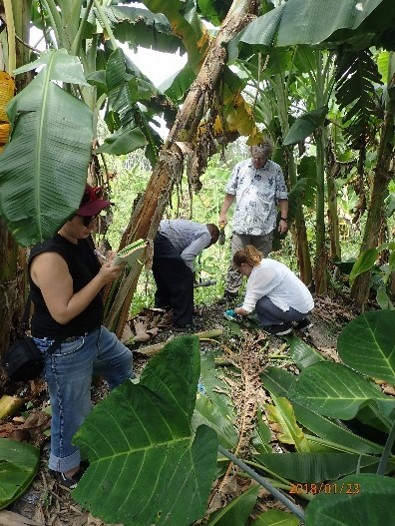
Launch event at the House of Literature, Oslo, September 2019
Under the title of «What does my mobile do in Africa?», the AnthroTox PhD students and Tanzanian co-supervisors Mmochi and Mangesho, and collaborators Mkalapa and Bunini, participated in presentations and in a debate on electronic waste led by T.H.Eriksen, with the Green party spokesperson, Arild Hermstad, and the leader of Restarters, Kaja Skarbø. During the launch week, we also had a one-day project workshop; public lectures by Mangesho, Awiti and Mkalapa at SAI and IBV; and individual supervisions.
AnthroTox reading group
During the entire duration of the project, AnthroTox participants and many others convened approximately once a month to discuss readings in the anthropology and history of environmental pollution, toxicity and toxicology.
Field course "Infrastructure of Protection", January 2019, Amani, Tanzania
Obe-week anthropology PhD course; led by 2 AnthroTox advisors (Harvey, Tousignant) and 4 supervisors (Geissler, Mangesho, Prince, Vendelin); attended by 4 AnthroTox students, 2 affiliated students, 4 students from MSC-ITN ANTHUSIA (co-funder). Student presentations, method discussions, lectures, two-day writing workshop. Individual supervisions with AnthroTox students preparing final part of fieldwork.
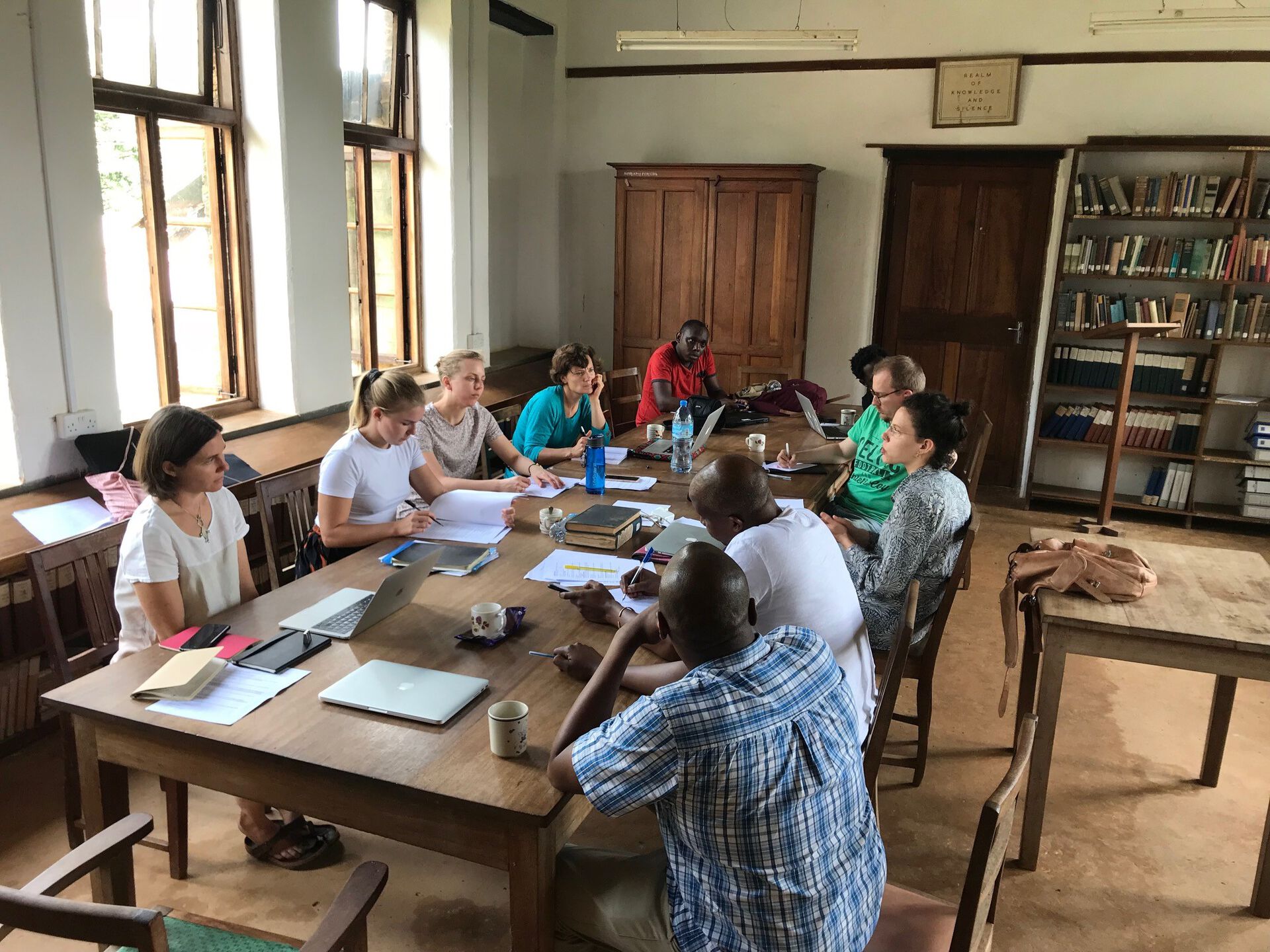
1st PhD workshop with Kim Fortun, UC Irvine, August 2019
AnthroTox anthropology PhD students took part in the UiO social science summer school on “Experimental ethnography: design, tactics, collaborations” led by AnthroTox advisor Kim Fortun, and in the subsequent two-day workshop for AnthroTox students, with Fortun, and supervisors Bauer and Geissler. Students presented and discussed their work with adviser and supervisors; individual supervision sessions.
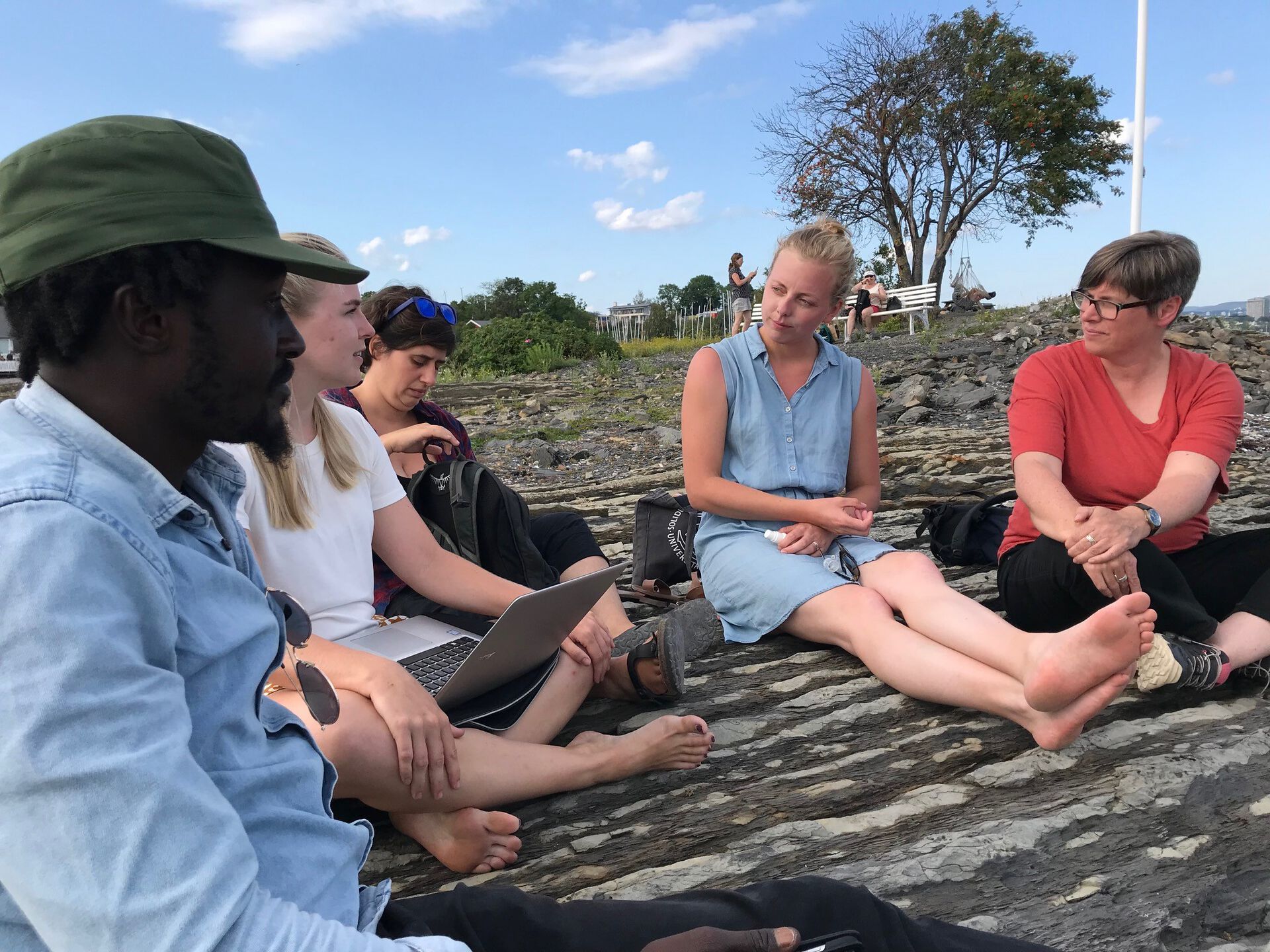
Workshop: Mimicry in Metabolism(s): Industrial Chemicals, Sythetic Hormones, and Unruly Bodies, February 2020, Tøyen Gård and Losæter
This workshop brought together people from different disciplines inside and outside academia in order to enable a dialogue on mimicry as a productive concept to understand and juxtapose industrial chemicals and synthetic hormones. In addition to the speakers and AnthroTox members, the workshop was attended by advisers Drs Aboud and Guardans.
Workshop: Pollution: Monitoring and Policy. How are international regulations of pollutants followed up nationally and locally in Norway and Tanzania? Tøyen Gård, February 2020
This workshop brought together Norwegian and Tanzanian environmental authorities to address how international regulations on persistent organic pollutants are met nationally and locally. Drs Aboud and Guardans were distinguished external participants invited by AnthroTox.
Writing retreat for PhD students, at IBV's field station in Drøbak, September 2021
AnthroTox PhD students – biologist and chemist, and anthropologist - engaged in writing, mutual reading, and discussions. The retreat aimed to allow students to reconnect after the lockdown, and engage with each other’s work without the supervisor's oversight/pressure, which worked well and strengthened interdisciplinary and collegial bonds.
Feedback session for Norwegian environmental agency, August 2023
Geissler presents and discusses AnthroTox findings with staff members of the environmental agency, hosted and chaired by project adviser Christine Tollefsen.
Dissemination in Tanzania, October and December 2023
Completed AnthroTox PhD students Ntapanta and Klaas visited Tanzania in order to feedback their research findings and discuss these with key stakeholders. In addition to meetings and public discussion events related to electronic waste, Ntapanta participated in several radio and TV shows, promoting knowledge on the e-waste problem and possible ways of addressing it.
2nd PhD workshop with adviser Kim Fortun, UC Irvine, Finse, October 2023
During this three-day event, Fortun introduced several AnthroTox anthropology students, as well as newly recruited PhD students working on persistent organic pollutants and pesticides in Tanzania, to her collaborative work on the “global environmental injustice record".
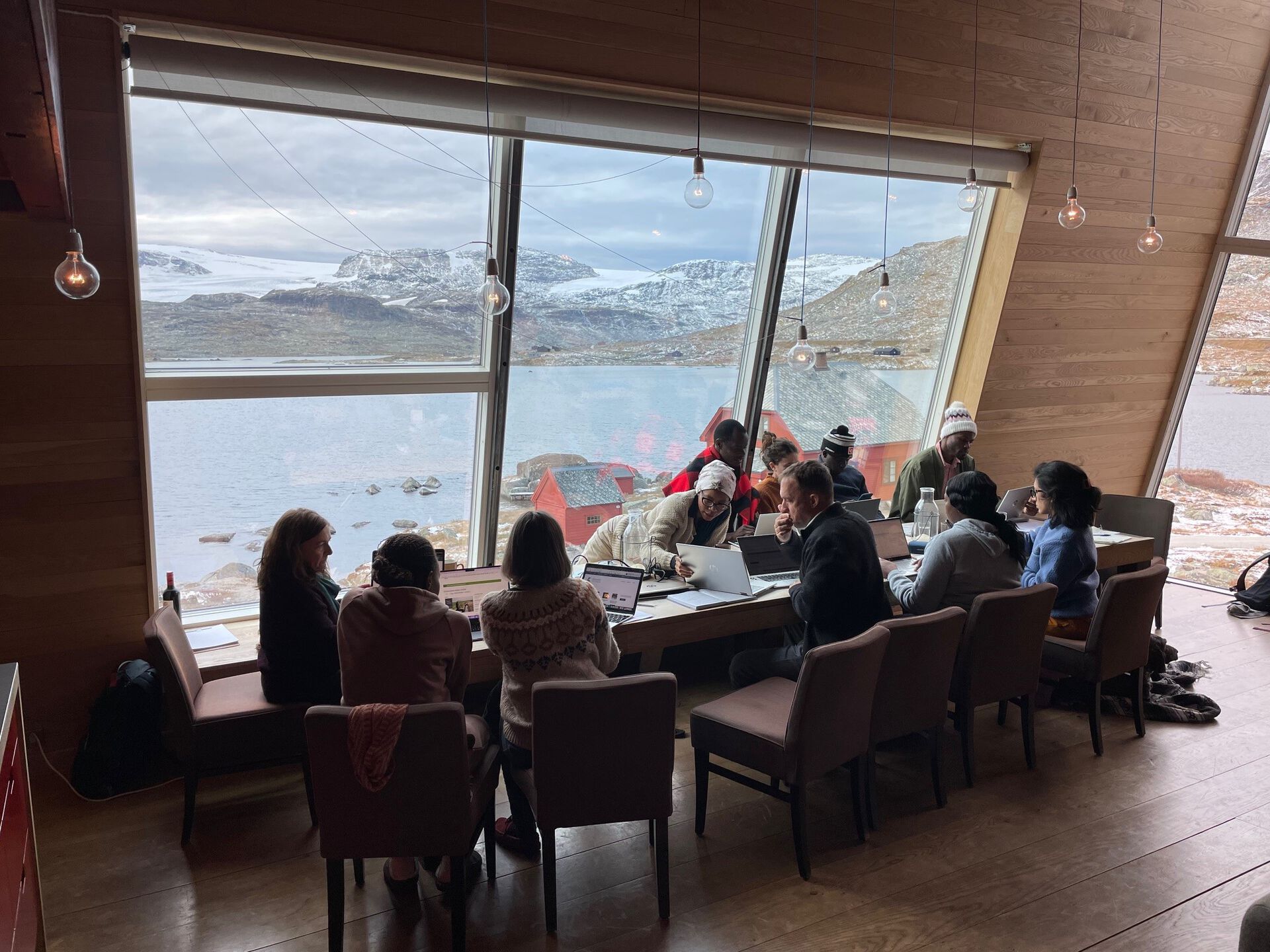
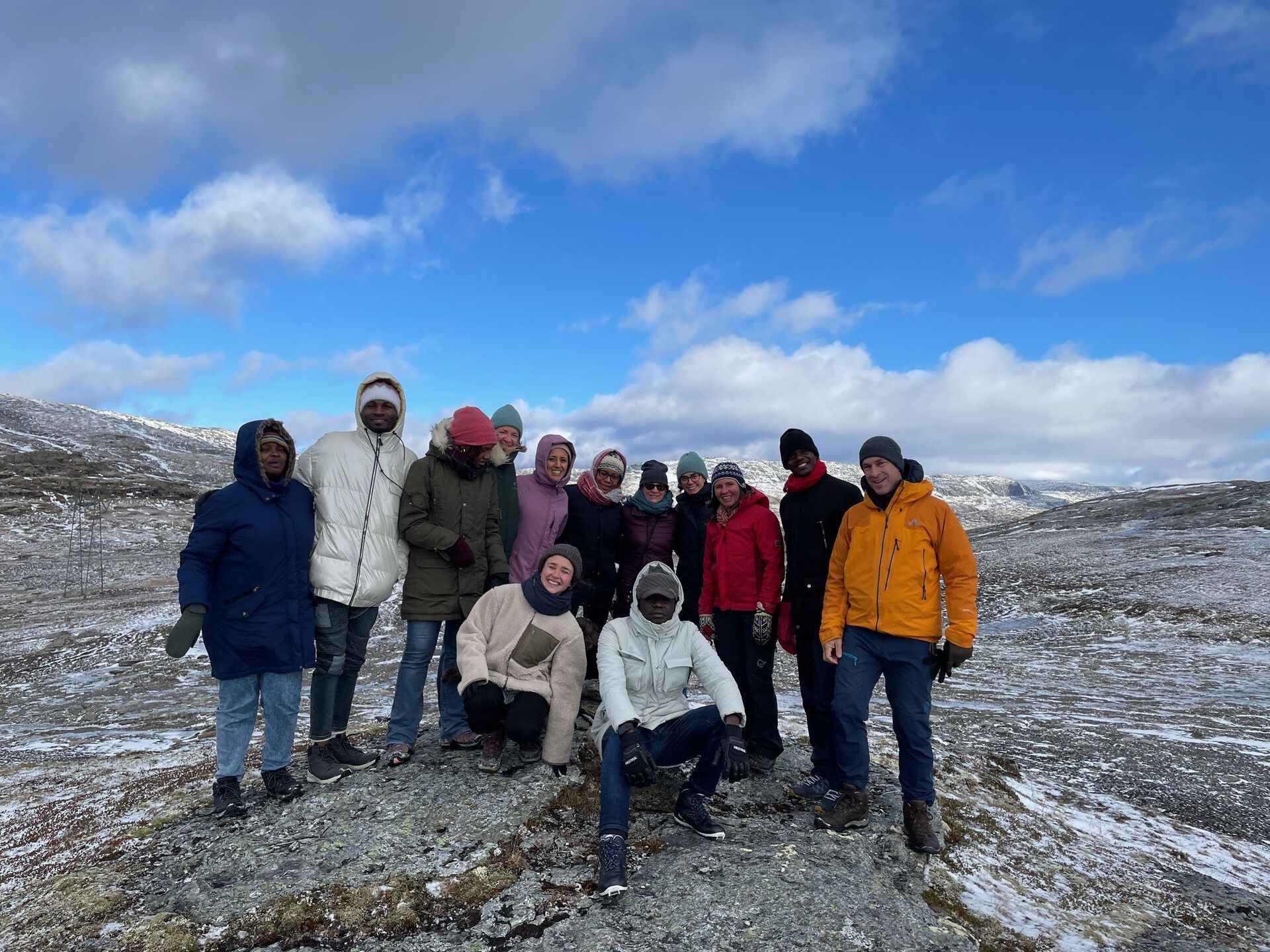
Project Afterlife
PhD course in environmental and medical anthropology
AnthroTox partners SAI and Helsam collaborated on the preparation and implementation of a new PhD course, under the auspices of Helsam. In the first run of the course, in October 2023, a number of new PhD students working on toxicology and persistent organic pollutants in East Africa participated.
Participation in PREHEAT project on pesticides in Tanzania
Geissler and Prince participated in the above mentioned project (2020-2023) with a Workpackage investigating pesticide use in a historical malaria scheme in northern Tanzania.
NFR/Fripro project "Epidemic Traces" (2022-2026)
A collaborative research project, one WP of which studies the toxic legacy is of insecticidal disease control in Africa and its long-term effects on human and environmental health.
NORHED "Medical and environmental anthropology for East Africa in the 21st-century" (2021-2026)
Training, research and capacity building programme to support environmental and medical anthropology in eastern Africa drawing on interdiciplinary lessons from AnthroTox.; the programme includes 4 PhD and 17 Master’s students studying environmental pollution - from agriculture and mining – and it’s health effects.
Funding and duration
The project was funded by UiO:Life Science from 2018 - 2023
For More Information
Detailed information and updates about the AnthroTox project can be found on the UiO:Life Science website. Explore the ongoing research, discoveries, and contributions to public debate and policy processes.










